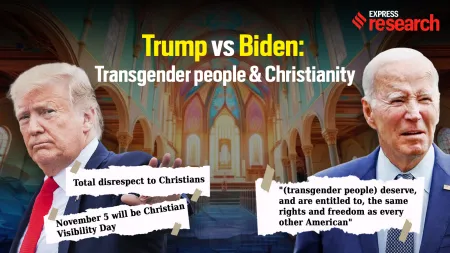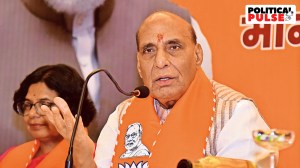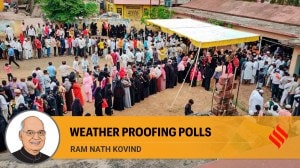- India
- International
Explained: Electricity Bill – promise, problems
The government wants to give consumers a choice of multiple power suppliers as is the case with mobile and internet services, apart from making provisions for timely and adequate tariff revisions.
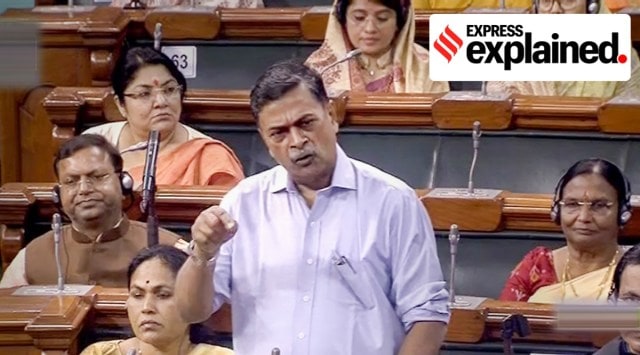 Union Power Minister R K Singh told the Lok Sabha the Bill was being sent to a standing committee for wider discussions. (SANSAD/PTI Photo)
Union Power Minister R K Singh told the Lok Sabha the Bill was being sent to a standing committee for wider discussions. (SANSAD/PTI Photo) The government Monday tabled the Electricity (Amendment) Bill 2022 in the Lok Sabha, soon after which it was referred to the parliamentary standing committee on energy for wider consultation with stakeholders.
Under the amendments proposed, the government is providing consumers a choice of power suppliers like mobile and internet service providers. It also has a provision for timely and adequate tariff revisions to help state utilities come out of losses and make payments for power in-time.
What does the amendment Bill propose?
For consumers, the Bill, cleared by the Union Cabinet last Wednesday, has proposed to amend Sections 42 and 14 of the Electricity Act, thus, enabling competition in retail distribution of power by offering the customers the option to choose electricity suppliers, just like they can choose telephone or internet service providers. The amended Section 14, the Bill says, will “facilitate the use of distribution networks by all licensees under provisions of non-discriminatory open access”, while Section 42 will be ameded to “facilitate non-discriminatory open access to the distribution network of a distribution licensee”.
The Bill, with the amendment of Section 62 of the Act, makes provision for “mandatory” fixing of minimum as well as maximum tariff ceilings by the “appropriate commission” to avoid predatory pricing by power distribution companies and to protect consumers.

Also, the amendment Bill has several provisions to ensure graded and timely tariff revisions that will help provide state power utilities enough cash to be able to make timely payments to power producers. This move is aimed at addressing the recurrent problem of default by distribution companies in payment to generation companies.
The bill through amendments in Section 166 of the Act also seeks to strengthen payment security mechanisms and give more powers to regulators. ”It has become necessary to strengthen the regulatory mechanism, adjudicatory mechanism in the Act and to bring administrative reforms through improved corporate governance of distribution licensees,” according to the bill.
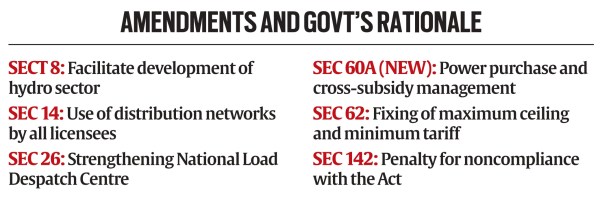
Why is it being opposed?
Provisions of the Bill are being opposed by a number of opposition-ruled states. After the Electricity (Amendment) Bill was introduced in the lower House of Parliament, Delhi Chief Minister Arvind Kejriwal tweeted to term the bill “dangerous” and said it “will benefit a few power distribution companies.
Kejriwal tweeted, “Electricity Amendment Bill is being brought in Lok Sabha today. This law is very dangerous. With this, instead of improving the power problem in the country, it will become more serious. People’s suffering will increase. Only a few companies will benefit. I appeal to the Centre not to bring this in haste.”
The House witnessed unruly scenes with some opposition MPs showing placards, tearing papers and flinging them into air as Power Minister R K Singh introduced the Bill in the Lok Sabha. While opposition parties like the Congress, DMK and the Left parties sought the withdrawal of the Bill, parties considered to be friendly with the BJP, like the YSRCP and the BJD, insisted on wider consultations. Opposing the introduction of the Bill, RSP’s N K Premachandran said the provisions of the proposed legislation were against the federal structure.
“It is an accepted Constitutional position that the basic features of the fundamental characters of the Constitution shall not be amended or altered, but the federal fabric of the Constitution of the country is being altered by particular States of the Union of India not being taken into consideration,” he said alleging that the Centre did not consult the states on the Bill. Premachandran said that power as a subject comes under the Concurrent List and it was the “the bounden duty or the mandatory obligation” of the Centre to consult the states. The Concurrent List contains subjects over which both the Union and state legislatures have jurisdiction.
How will these amendments help?
The Bill comes at a time when there is a debate around freebies being offered by political parties that has also, among other things, led to various state power distribution companies (Discoms) not being able to raise enough resources to make timely payments to power generating companies. According to latest government data, Discoms of three states — Tamil Nadu, Maharashtra and Telangana – are have to pay about 57 per cent of the total dues owed to power generating companies, followed by three BJP-ruled states of Uttar Pradesh, Jammu & Kashmir and Madhya Pradesh, who account for another about 26 per cent of the total dues of Rs 114,222 crore owed to power generation companies.
Government data updated till March 31, 2022, reveals that states owe Discoms Rs 62,931 crore for services and another Rs 76,337 as cost of freebies announced by them.
Among the states that have defaulted on payments to Discoms, Telangana leads the chart with a cumulative outstanding of Rs 11,915 crore, followed by Maharashtra at Rs 9,131 crore. BJP-ruled Uttar Pradesh leads the pack among states that have not made payments to Discoms for subsidies at Rs 18,946 crore, followed by Madhya Pradesh (Rs 16,240 crore). While the top three together owe Rs 65,041 crores, the next three BJP-ruled states owe Rs 29,280 crore of the total, according to a PRAPTI (Payment Ratification and Analysis in Power procurement for bringing Transparency in Invoicing of generators) data till July 31, 2022.
Experts recommend that empowering the regulator to be able to take calls on tariff revision and ensuring that the government freebies, even on electricity, should be through direct benefit transfer.
More Explained
EXPRESS OPINION
May 05: Latest News
- 01
- 02
- 03
- 04
- 05










